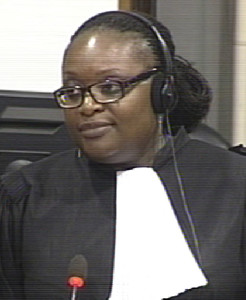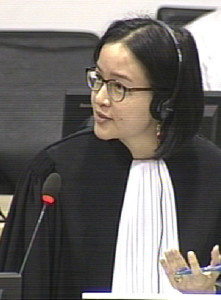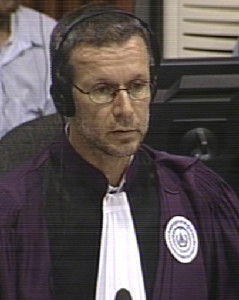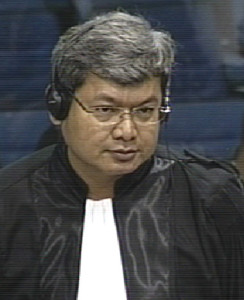Context Is Vital, Defense Counsel Argues In Response to Key Document Presentations
Today, responses by the Khieu Samphan Defense Team to the key document presentation by the Co-Prosecution and Civil Party Lead Co-Lawyers were heard, as well as responses to requests to summon a Civil Party. Moreover, a discussion on the scheduling order was heard. In their responses to the key document presentations, the Khieu Samphan mainly argued that the documents needed to be put into context and that one should refrain from making generalizations based on individual accounts.
Responses to Key Document Presentations

Khieu Samphan Defense Counsel Anta Guissé
International Civil Party Lead Co-Lawyer Marie Guiraud was absent for personal reasons. The floor was handed to the Khieu Samphan Defense Team to give their comments regarding
Ms. Guissé reminded the chamber of the defense’s right to challenge witnesses. This meant that the documents presented by the Co-Prosecution did not have the same probative value. She said it was violation of their right. The Civil Party Co-Lawyers had assured that they cross-checked the information. However, they looked at the evidence “from another point of view” and that always the information was not always consistent.
As for the documents presented on Tuesday by the Co-Prosecution, she said that the documents had to be put into context and that the Co-Prosecution had often represented the opinions of authors as facts. For example, Elizabeth Becker had argued that Pol Pot and Ieng Sary’s marriages were not marriages of love. This represented Becker’s opinion, Ms. Guissé said, and was not to be taken as a fact. Moreover, marriages of convenience often took place in the Cambodian society, she said, in which alliances between members of the same cultural background were built through marriages and love was not seen as a prerequisite for marriages.[1]

Nuon Chea Defense Counsel Doreen Chen
Behind the Killing Fields.[2] Further, one should be cautious when quoting the accused and deriving the policy from there. They did not necessarily represent the policy of the regime.[3] She also pointed out that many articles about the need to increase the population did not mention a marriage policy. Instead, they mentioned the need to improve the health and living conditions of the population.[4] Hence, it was important to put these quotes into context.[5] This also applied to the speech by Pol Pot, which she argued painted a much broader and general vision than the excerpt presented by the Co-Prosecution.[6] She also pointed to parts of documents that showed that the Democratic Kampuchea government aimed at improving health care by training doctors and eradicating malaria, for example.[7] She also pointed to the issue of external trade that was mentioned in some documents.[8]
Other documents also showed, Ms. Guissé said, that the Khmer Rouge aimed at improving living conditions by attempting to provide more food to the population.[9] As for the book by Khieu Samphan quoted by the Co-Prosecution, she highlighted that Khieu Samphan commented on what had been written by Philip Short. This needed to be put into context as well.[10] She said that the Co-Prosecution had read out an incomplete quote and included the part that had been left out by them: Philip Short had said that traditionally families arranged marriages and that now Angkar had taken the role.[11] It was said that during the marriage, the rest of the population had to be taken into account as well, and not only the private interests of the couple.[12] Also the 12 Moral Principles and their interpretation needed to be put into context.[13] Ms. Guissé pointed out that the Co-Prosecution had essentially said that the Sixth Moral Principle did not mean anything, because it was violated.[14] She said that this conclusion did not follow. As for suicide mentioned, she said that this was the interpretation by the Co-Prosecution.[15] The same applied to the number of marriages and living conditions.[16] One should refrain from making generalizing assumptions of interview. Often the views presented were merely that of the author – such an approach to generalization should not be used in court. Additionally, the defense had no opportunity to cross-examine Sihanouk, who had been quoted by the Co-Prosecution.[17] This posed a problem for the defense.[18]
At this point, the President adjourned the hearing for a break.
After the break, Ms. Guissé pointed to the Written Record of Interview of Ruos Suoy.[19] She highlighted that he had said that he did not know here the order to marry came from and under what conditions. She then referred to a few individual Written Records of Interviews, and said that these accounts had to be examined individually and put into context.[20]
As for the documents presented by the Civil Party Lead Co-Lawyers, she said that the Civil Party Lawyers had omitted an answer of a Civil Party, who had said that she had not heard of arrests of those who refused to marry, and that the Trial Chamber was not seized of rape in the context of marriages – the answers read out by the Civil Party Lawyers should therefore be seen in this light.[21] Lastly, she argued that the accounts were many diverse experiences – an aspect which she said was “extremely important”. With this, the key document hearing was concluded.
Submissions and Responses to Call Additional Civil Party

Senior Assistant Prosecutor Vincent de Wilde
The floor was granted to Civil Party Lead Co-Lawyers to respond to a request to summon one additional Civil Party and admit related documents.[22] National Civil Party Lead Co-Lawyer Pich Ang said that the Civil Party had relevant information and that this Civil Party should therefore be called. The Nuon Chea Defense Team had no submission. Ms. Guissé argued that the request was extremely late. This Civil Party had already been footnoted in the Closing Order of the Co-Prosecutors. Moreover, it was not correct that the Civil Party was related to the treatment of the Vietnamese. She requested to reject the entire application. For the Co-Prosecutors, Mr. Vincent de Wilde replied that the defense team had said that if Civil Parties do not appear the information could not be used, since they could not cross-examine this. Calling of this Civil Party was therefore in the interest of the defense. Moreover, the defense had “all the time they need” to prepare. [23] Mr. Ang then informed the Chamber that the Civil Party was available to testify.
Discussion about Scheduling Order

National Civil Party Lead Co-Lawyer Pich Ang
Next, observations of the different teams were heard regarding the scheduling of witnesses and Civil Parties. The Nuon Chea Defense Team said that they were in a position to examine witnesses 2-TCW-961, 2-TCW-960, 2-TCW-1041, 2-TCW-1037, 2-TCW-1036, and 2-TCW-1031. If the expert was not coming to testify, the Nuon Chea Defense Team request two more experts to testify, namely Steven Heder and Steven Morris. The Co-Prosecution said that the witness proposed by the Nuon Chea Defense Team could not be heard before Pchum Ben. In general they would rely on the chamber’s wisdom. The Civil Party Lead Co-Lawyers had no particular observation and they would rely on the discretion of chamber and availability of civil parties and witnesses. 2-TCCP-264 and 2-TCCP-251 had health issues, however. As for postponing the impact hearing, he explained that they faced financial issues and arrangement issues of Civil Parties. He hoped to have sufficient information by Tuesday next week.
They then heard oral responses regarding the summonsing of Civil Party 2-TCCP-1064.[24]
Presiding Judge Ya Sokhan then adjourned the hearing. It will resume on Tuesday, September 13, 2016, at 9 am.
[1] E3/20, When the War Was Over
[2] E3/4202.
[3] E3/4202, at 00849378 (EN), 00858254 (KH), 00757496 (FR).
[4] E3/1586, at 00617797 (FR); paragraphs 60 and 45, 00617795 (FR), 000079813 (EN).
[5] E3/1385, at 00524093 (FR), 000064617 (KH), 00488637 (EN).
[6] E3/7233R; E3/290, 00168651 (EN)
[7] E3/686, at S00644682 (KH), S00030349 (EN), 00599792 (FR).
[8] E3/25, at 000063054 (KH), 00491435 (EN), 00504063 (FR).
[9] E3/5652, at 00280381 (FR), S00010565 (EN), 00249991 (FR).
[10] E3/16, Recent History of Cambodia, at 00639883 (FR), 00380467 (KH).
[11] E3/9, 00365893 (EN).
[12] E3/750, at 00063616 (KH), 00052461 (EN), 00525858 (FR).
[13] E3/730, at 00651527 (FR), 00064309 (KH), 00392451 (EN).
[14] E3/765.
[15] E3/1094/
[16] E3/1092, at 00611449 (FR), 00289924 (EN), 00143579 (KH).
[17] E3/993.
[18] D3/2813, at 00632939 (EN), 00395353 (FR).
[19] E3/10620.
[20] E3/9000, The Mystery of Sexual Violence under the Khmer Rouge Regime, at 00992914 (EN); E3/378, at 00342203 (FR), 00345541 (EN), 00349538 (KH); E3/9575, 0114036 (FR), 01025287 (EN), 00996490 (KH); E3/9098.
[21] E3/9790, at answer 92 and 93.
[22] E436.
[23] E3/1957.1.7.
[24] E3/9820
Featured Image: Courtroom from the public gallery (ECCC: Flickr).
